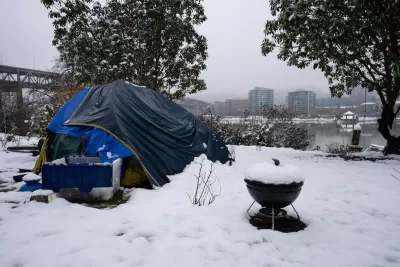Advocates say using an arbitrary temperature cutoff to open and close winter shelters ignores the reality of cold weather risks.

A decision by Multnomah County officials to shutter overnight winter shelters this week left hundreds of unhoused Portlanders out in the cold and other service providers scrambling to find alternate shelter options.
As Nicole Hayden explains in The Oregonian, “By policy, Multnomah County opens winter shelters when temperatures are forecast to dip to 25 degrees or below, if snow accumulation is forecast to reach an inch or more or if an inch or more of rain is forecast to fall overnight with temperatures are at or below 32 degrees. The thresholds must persist for four hours or occur between 8 p.m. and 7 a.m. to trigger shelter openings, according to the county.”
“Unhoused Portlanders, advocates and nonprofit leaders across the region expressed grave worry and frustration over the county’s decision to cut off access to safe spaces while wet, windy and icy conditions persisted.” People living outside face dangers ranging from hypothermia to the risk of fires and smoke inhalation inside tents.
FULL STORY: Unhoused Portlanders struggle amid icy conditions after shelters close

Alabama: Trump Terminates Settlements for Black Communities Harmed By Raw Sewage
Trump deemed the landmark civil rights agreement “illegal DEI and environmental justice policy.”

Planetizen Federal Action Tracker
A weekly monitor of how Trump’s orders and actions are impacting planners and planning in America.

How Atlanta Built 7,000 Housing Units in 3 Years
The city’s comprehensive, neighborhood-focused housing strategy focuses on identifying properties and land that can be repurposed for housing and encouraging development in underserved neighborhoods.

In Both Crashes and Crime, Public Transportation is Far Safer than Driving
Contrary to popular assumptions, public transportation has far lower crash and crime rates than automobile travel. For safer communities, improve and encourage transit travel.

Report: Zoning Reforms Should Complement Nashville’s Ambitious Transit Plan
Without reform, restrictive zoning codes will limit the impact of the city’s planned transit expansion and could exclude some of the residents who depend on transit the most.

Judge Orders Release of Frozen IRA, IIJA Funding
The decision is a victory for environmental groups who charged that freezing funds for critical infrastructure and disaster response programs caused “real and irreparable harm” to communities.
Urban Design for Planners 1: Software Tools
This six-course series explores essential urban design concepts using open source software and equips planners with the tools they need to participate fully in the urban design process.
Planning for Universal Design
Learn the tools for implementing Universal Design in planning regulations.
Caltrans
Smith Gee Studio
Institute for Housing and Urban Development Studies (IHS)
City of Grandview
Harvard GSD Executive Education
Toledo-Lucas County Plan Commissions
Salt Lake City
NYU Wagner Graduate School of Public Service





























